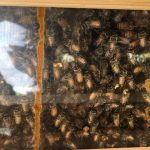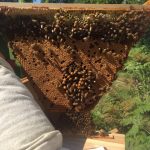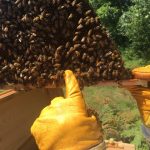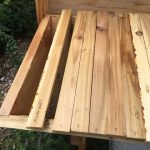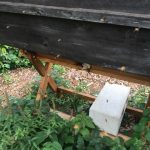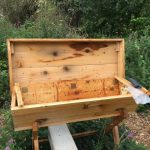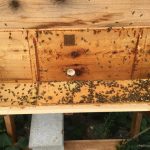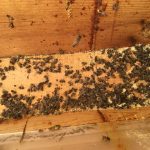Checking for Honey Stores and a Devastating Loss
It’s August nineteenth and I am thinking more and more about winter for the bees. The main purpose for today is to make sure the bees are storing enough nectar and honey to get through the winter. Of course I will also check on the bees and see how they are doing. During this inspection I am not at all rushed, so I am hoping that the bees will feel better about me being there. Last time they were not happy about my feeling rushed.
The first hive that I visited was the Orchard Hive. The weather was great, it was seventy seven degrees and sunny out. As usual I started with checking around the outside of the hive. Everything looked good, the bees are bringing pollen in. The entrance to the hive was busy with bees coming and going. The flowers nearby are covered in honey bees. Looking in the observation window of the hive I saw a nice big colony.
When I opened the lid I could hear a friendly hum from the bees. I was already feeling better about this inspection. As I removed the first bar some bees came out to say hi, but they were not at all aggressive. What a relief to feel relaxed and have relaxed bees. This colony can be too relaxed sometimes and it can take quite a while to get them to go back into the hive. Since I wasn’t in a rush I didn’t hurry the bees. I took my time gently nudging them to go back in or to get out of the way of the bars.
That first bar that I removed was full with beautiful capped honey. There were also two queen cups on the comb, but no brood at all. I decided to steal that bar from them and they didn’t seem to mind. As I continued through the hive, I found everything that I needed to. I saw eggs, larvae at all different stages, capped brood, pollen, nectar, and capped honey. Most of the bars in the hive had some amount of honey. The bars with brood had less honey and the other bars had more.
In the brood nest I added three more empty bars and I removed a couple of empty bars on the end. I had one comb break that was full of honey, so I stole that one too. This colony has plenty of honey and I need to make sure the queen still has some space to lay eggs. I don’t want another late season swarm, especially this late.
There was still some drone brood in the brood nest. Some beekeepers are concerned about that and they kill off the drone brood. I believe that the bees know what they are doing and we interfere too much in what they do. I am not concerned to see some drone brood even at this point in the season. There is always much more drone brood in the spring. I also found the queen during this inspection, so I know she is there and there is not a laying worker. All of the eggs that I saw were one to a cell and right in the center. I do feel a bit sorry for the boys because once they emerge there is not much time left for them, the workers have already started removing the drones in preparation for winter.
The Orchard Hive looks great and they have a lot of nectar and honey stored up. It was about this time last year that my hives barely had any nectar or honey stores, but by mid-September they had plenty. This colony has already surpassed that. It helps that they have such amazing forage all around them. Old Frog Pond Farm is a heaven for honey bees. There are wild flowers and other sources of nectar everywhere you look here. The hive is also close to a water source, so even though we are in a drought the bees have constant access to water.
After finishing the inspection and stealing some honey, it was time to walk over to the Willow Hive. The first thing that I noticed when I got to the Willow Hive is that there isn’t a lot of honey bee activity. I checked the front door and there were bees coming and going, but not as many as usual. I know that this colony is small due to the late season swam, but I was hoping that they would be growing. Looking in the window was worrisome, there were not many bees in the hive either.
I knew that the inspection needed to be extremely thorough to make sure that I found out all I could about what was going on. The hive was completely full of honey and nectar which is why the original queen and most of the colony swarmed. There was no brood to be found even though it has been 10 days since I had inspected last and found the new queen. I thought by now there would be eggs and some larvae.
After going through the hive completely, I went through it again just to make sure I did’t miss anything. Sure enough, I hadn’t. There was no brood at all and I did not find the queen. I decided that I would take a bar from the Orchard Hive that I knew had eggs on it and put it into the Willow Hive. My plan was to come back the next morning to do that.
August twentieth I returned to Old Frog Pond Farm. I was still hopeful that the colony could be saved. After looking at my notes from the day before, I decided which bar to take from the Orchard Hive. I started at the Orchard Hive and removed the bar that I was going to place in the Willow Hive.
Walking up to the Willow Hive I knew that something was not right. There were a lot more bees than yesterday and they were acting frantic. That usually means one thing, robber bees. That’s exactly what they were. The bees had killed off my little colony and they were robbing the hive. Once I was sure that my colony was dead, I decided to take all of the honey and comb away as quickly as I could. Luckily, I had another beekeeper there helping me. Between the two of us we removed the comb, got all of the bees off, and filled my reusable grocery bags with the bars of comb and honey.
Once everything was removed from the hive I spent some time looking in at the bees. I found the dead queen on the bottom and I collected her and a worker. I decided that I would use this devastating loss as a way to educate people and I am going to have the bees mounted and framed. I will have the queen, a worker, and a drone in the frame. I also collected a sample to send to the honey bee diagnostic lab in Maryland. For more information you can go to https://www.ars.usda.gov/northeast-area/beltsville-md/beltsville-agricultural-research-center/bee-research-laboratory/docs/how-to-submit-samples/.
As any beekeeper will tell you losing a colony is sad. This time it’s worse for me because had I have been on top of things and removed some of the honey earlier the bees may have stayed. If they would have stayed they would have been strong enough to fight off robber bees. I have learned a lot from this though. It’s so important to be really paying attention to what is going on inside the hive even if it means that you do things that you were previously told not to. The hive was too full of honey and the queen had no where to lay eggs, but I had been told not to take honey from a first year top bar hive. In the future I will pay closer attention to the individuality of each hive and understand that just because it’s how things may have been done doesn’t mean that I have to follow that advise especially if it doesn’t apply to the situation.
